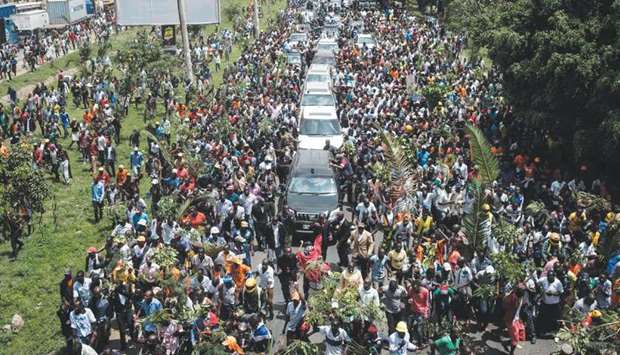Five killed in Kenya violence as Odinga returns
Published on November 18, 2017 at 11:57 AM by FACE OF MALAWI
At least five people were killed yesterday as Kenyan police tried to disperse supporters accompanying opposition leader Raila Odinga from the airport to central Nairobi, police said.

Supporters of Raila Odinga march with his convoy upon his arrival from the Jomo Kenyatta International Airport.
Police fired tear gas at the convoy in which Odinga was travelling and used water cannon as they tried to stop it reaching the capital’s main business district.
Some protesters threw stones at police. Two vehicles, including a police truck, were set on fire. A Reuters photographer saw two bodies with gunshot wounds as police and protesters fought on one of the main roads leading to the business district.
Police said five people were stoned to death by angry mobs after they were caught stealing and denied they had used excessive force against the opposition supporters.
“These incidences occurred before the police arrived at the various scenes,” the police service said in a statement. Police retreated several times along the route after the protesters were unmoved by the teargas and water cannon spray.
They finally held their ground near the city’s main park, where Odinga, just returned from the United States, intended to address a rally that had been banned.
He blamed President Uhuru Kenyatta for the violence. “My anger is with that guy called Uhuru Kenyatta.
I went abroad…After you welcomed me well, he sent policemen to teargas you, to beat my people, to fire bullets at them. Isn’t this barbaric?,” he told his supporters after driving to safety.
Odinga has called for a ‘National Resistance Movement’ to protest against the outcome of a repeat presidential election last month which saw Kenyatta win a second, five-year term with 98% of the vote after Odinga boycotted the contest. Only 39 % of registered voters took part.
The repeat poll was ordered by the Supreme Court after it annulled the results of the August election, won by Kenyatta, over procedural irregularities. The court will rule on Monday on cases that seek to nullify the rerun election.
The political crisis has stirred fears for the stability of Kenya, a regional hub for trade, diplomacy and security.
Earlier yesterday, demonstrators threw up burning barricades on Mombasa Road, the highway that links Nairobi’s downtown business district and the airport.
Despite a partial police ban on protests in the capital, hundreds of people had gathered in the morning near Jomo Kenyatta International Airport to await Odinga’s return. Police fired into the air to disperse them.
Once Odinga landed, motorcycle taxi drivers and people on foot shouted their support as the motorcade, which included lawmakers from Odinga’s opposition coalition, began moving toward central Nairobi.
Dozens of international flights depart and arrive daily at Nairobi’s main airport.
The national airport authority said on Twitter just before midday that operations were running normally.
Kenya Airways said it had been “impacted” by the disruptions around the airport and offered to book travellers who missed their flights on subsequent ones. Kenya’s prolonged election season has disrupted its economy.
Human rights groups say at least 66 people have died in bloodshed surrounding the two elections.
Ahead of Monday’s Supreme Court ruling, Kenya Airways’ chairman told an investor briefing: “Hopefully we don’t have another presidential election so we can get on with life.”


